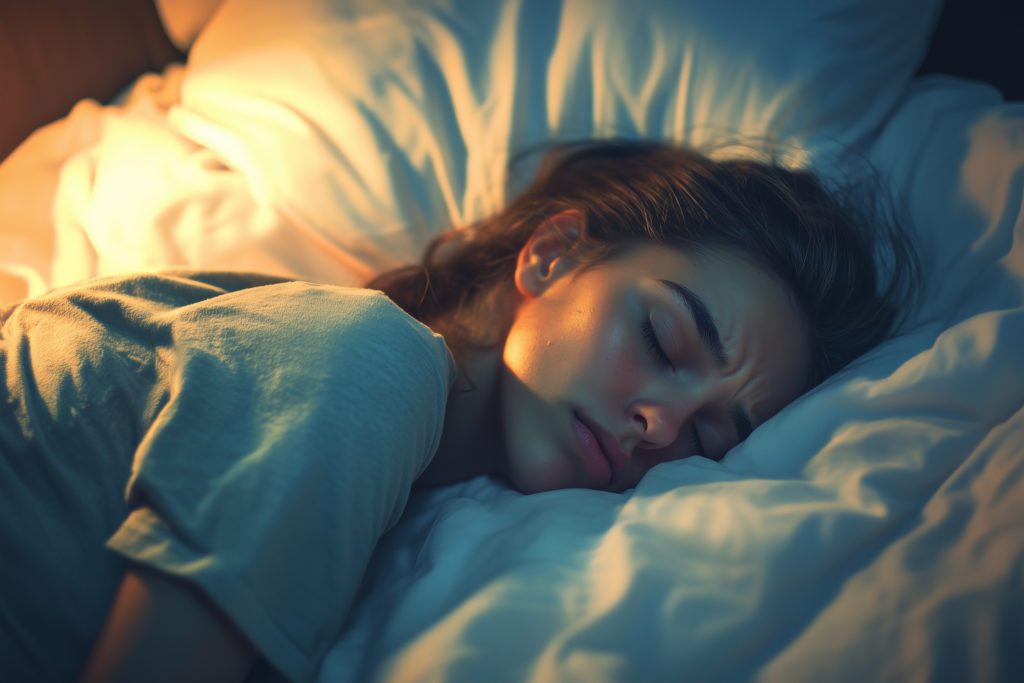
The Role of Cortisol in Sleep Disturbances: Understanding the Stress Hormone
Learn about the stress hormone cortisol, how it influences sleep, and ways to lower cortisol levels to sleep better at night.

We’ve all had nights where we fight to fall asleep because the worries from the day invade our thoughts. Whether you’re trying to create a mental to-do list or replaying an interaction that didn’t go as you had planned, stress can eat away at our calmness and leave us struggling to fall asleep. In some cases, we may even be stressed about how little sleep we’re getting.
Stress is a universal response to challenges and threats, and it prompts the secretion of cortisol, commonly called the stress hormone. However, this hormone can have a lasting influence on our sleep, making it harder to fall asleep and leading to more awakenings during the night.
Let’s explore how cortisol influences our sleep and what you can do to lower its levels—once and for all—to get some much-needed rest.
What is Cortisol?
When we feel stressed, our heart beats faster, our senses sharpen, and we breathe faster than normal. These are universal reactions to stress, and they can all be attributed to cortisol, the stress hormone.
Hormones are chemicals that carry messages through our blood to the skin, organs, muscles, and tissues. These messages signal to the body to complete a specific action.
Cortisol has many roles, including:
- Regulating the body’s stress response
- Suppressing inflammation
- Helping your body control its use of fats, carbohydrates, and proteins
- Regulating blood pressure
- Controlling your sleep-wake cycle
- Regulating blood sugar
Like everything else in your body, balance is key, and your body continually monitors your cortisol levels to ensure they remain steady. This is because cortisol levels that are too high or too low can harm your health; just like Goldilocks, something in between the two extremes is just right.
Almost every tissue in the body has receptors that cortisol can nestle into, setting off a specific action, meaning cortisol can affect nearly every organ system in the body. Knowing this, it’s easy to see just how influential this hormone can be.
As for how much our cortisol levels increase when we’re stressed, it’s likely more than you would expect. The participants of a study completed in 2018 were medical students getting ready to take a committee exam, and their cortisol levels were measured 40 days before the exam (the relaxed period) and then again on the day of the exam (the stressful period). After comparing the cortisol levels in these two periods, it was found that cortisol is approximately nine times higher during stressful periods compared to relaxed periods.
If you experience chronic stress, this means that you continually have 9 times as much cortisol in your body as you should. There are many consequences to consistently high levels of cortisol because of all the areas it influences, including your sleep.
How Cortisol Influences Your Sleep
Your cortisol levels fluctuate during the day, which helps regulate your sleep-wake cycle. In the evening, cortisol levels are lower, and they peak right after you wake up in the morning.
However, stress can interfere with your sleep, and this may, in part, be because of the role of cortisol.
The Body’s Response to Cortisol
Cortisol has receptors all over the body, and when it merges with them, it can trigger responses such as:
- High blood sugar
- Rapid heart rate
- Sharpened senses
- Rapid breathing
These responses are part of your stress response to face threats—they’re designed to help you face a challenge and remain alive. What they are not suitable for, though, is falling asleep.
The HPA Axis
Beyond cortisol hindering your ability to fall asleep, cortisol and sleep share the hypothalamic pituitary adrenal (HPA) axis in your brain—a network that releases hormones as needed to respond to the body’s needs.
When the body faces a threat, it releases stress hormones such as cortisol. However, your sleep cycle also shares the HPA axis. So, if something (like stress) disrupts the HPA, it can affect everything that relies on this pathway, including your sleep.
You sleep in cycles each night, varying in the deepness of sleep, how relaxed the body is, and the primary modes of repair completed by the body. Your body even experiences smaller bursts of cortisol corresponding to sleep cycle shifts.
However, research has found that an overactive HPA axis (which can occur when cortisol levels are high because of stress) can disrupt your sleep cycles and cause:
- Insomnia
- Fragmented sleep
- Shortened overall sleep time
Even more, these sleep disturbances can further affect your HPA axis, then affecting your cortisol production. Studies have shown that sleep disturbances such as insomnia can cause your body to secrete more cortisol during the day, with one theory being that this is to stimulate alertness. However, more cortisol production can affect nighttime sleep, perpetuating the cycle.
Managing Cortisol for a Good Night of Sleep
We know that high cortisol production can keep you awake at night, but how can we keep this hormone in a normal range?
Some ways that you can help lower your cortisol levels include:
- Taking fish oil and ashwagandha supplements
- Modifying your diet to eliminate cortisol-triggering foods (e.g., refined sugars, animal proteins, fat, salt)
- Acknowledging and reframing stressed and anxious thoughts
- Relaxing through yoga, deep breathing techniques, or listening to music
- Exercising regularly at a moderate intensity
- Spending time with a pet
- Considering therapy
If you have sleep issues, it may also be helpful to talk to your doctor to determine if they require interventions beyond lowering cortisol levels for proper management.
Don’t Stress About Sleep
Cortisol is primarily known as the stress hormone, which can cause physiological reactions such as a fast heart rate, faster breathing, and sharpened senses. These reactions do not correlate well with sleep, though, which is why cortisol naturally lowers at night.
However, cortisol and sleep share the same pathway in the body, meaning an imbalance in one can affect the other. This may be why those who are stressed can’t fall asleep or experience fragmented sleep.
Implementing lifestyle changes that promote lower cortisol levels can help keep this hormone in check. For those looking to upgrade their sleep even further, it’s best to improve your sleep hygiene and focus on creating an optimal environment for sleep. Pillow offers resources to help you accomplish this and spend less of your time in bed worrying about what happened during the day.
FAQ
Are there any medical conditions that cause abnormal cortisol levels affecting sleep?
Conditions like Cushing’s syndrome, where excessive cortisol is produced, and Addison’s disease, which causes cortisol deficiency, can both disrupt sleep. These imbalances may lead to insomnia, fatigue, or irregular sleep-wake cycles, requiring medical intervention.
How does cortisol interact with other hormones that regulate sleep, like melatonin?
Cortisol and melatonin work inversely—high cortisol in the morning helps wakefulness, while rising melatonin at night promotes sleep. Chronic stress or hormonal imbalances can disrupt this rhythm, causing sleep difficulties and increasing the risk of insomnia and daytime fatigue.
How does shift work or an irregular sleep schedule impact cortisol levels?
Disrupting the body's natural sleep-wake cycle, such as through shift work or frequent travel, can cause cortisol to remain elevated at night. This makes it harder to fall asleep and increases the risk of chronic sleep disorders, leading to fatigue, impaired cognition, and metabolic issues.
Can medications influence cortisol levels and sleep?
Some medications, like corticosteroids, antidepressants, and stimulants, can raise cortisol levels, leading to sleep disturbances, insomnia, or fragmented sleep. Long-term use may disrupt the natural sleep cycle, so it’s essential to consult a doctor about timing and potential alternatives.
Can cortisol levels be tested to assess sleep-related issues?
Cortisol levels can be measured using saliva, blood, or urine tests to evaluate hormonal imbalances affecting sleep. A doctor may recommend these tests if someone experiences chronic fatigue, insomnia, or stress-related sleep issues, helping guide potential treatments or lifestyle changes.
Do genetic factors influence cortisol production and its effect on sleep?
Genetics influence how the body regulates cortisol, affecting an individual’s stress response, circadian rhythm, and vulnerability to sleep disorders. Some people naturally produce higher cortisol levels, making them more prone to insomnia, while others may have lower levels that impact energy regulation.
How do social interactions and emotional well-being impact cortisol and sleep?
Positive social relationships and emotional stability help regulate cortisol, reducing stress and promoting restful sleep. However, chronic stress, loneliness, or anxiety can elevate cortisol, leading to difficulties falling and staying asleep, as well as worsening overall mental and physical health.

Written by
Jessica G
Medical writer freelancer who has written hundreds of articles on varying topics. Masters of Engineering degree in Biomedical Engineering.
Download Pillow
Get help
Press & News
Legal
Connect
X (Twitter)
Company
Copyright © Neybox Digital Ltd.



